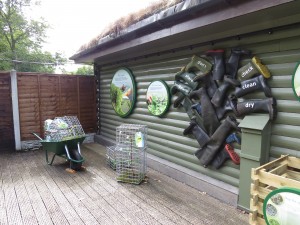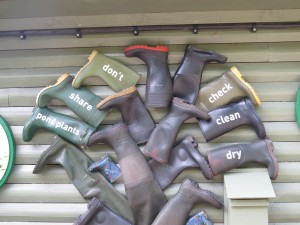Educational exhibit on dangerous plants unveiled at WWT Martin Mere
 A colourful exhibit which helps gardeners and pond owners to avoid the spread of damaging invasive non-native plants has been opened at WWT Martin Mere Wetland Centre.
A colourful exhibit which helps gardeners and pond owners to avoid the spread of damaging invasive non-native plants has been opened at WWT Martin Mere Wetland Centre.
Invasive non-native plants and animals cost the British economy at least £1.7bn each year. Water plants in particular spread easily – even the tiniest dropped fragment can grow into huge dense mats which choke native British wildlife of light, space, oxygen and nutrients.
Gardeners and pond owners can help to stop the invasion by composting plants carefully and not sharing them between ponds.
But they all need to know what they’re looking for. So, with the help of Defra funding, WWT has made lifelike models of the six worst invasive water plants which are prone to escape in Britain and pointedly housed them in cages to show they need to be contained in order to protect British wetlands!
 Five of the six plants (listed below) will be banned from being sold in England and Wales from next April. The new exhibit will support that ban by showing nearly 200,000 visitors a year to Martin Mere Wetland Centre why these plants are such a problem, and how they too can help to protect Britain’s wetlands.
Five of the six plants (listed below) will be banned from being sold in England and Wales from next April. The new exhibit will support that ban by showing nearly 200,000 visitors a year to Martin Mere Wetland Centre why these plants are such a problem, and how they too can help to protect Britain’s wetlands.
Centre Manager, Nick Brooks, said: “Invasive plants are a major threat to wetlands, which are home to more native wildlife and plant species in Britain than any other habitat.
“WWT Martin Mere is a great place to have fun finding out how beautiful wetlands are, how they affect our lives, and how everyday things we do can make a difference.
“Just composting one plant carefully, or checking one piece of water equipment is cleaned properly, could prevent native plants and wildlife dying and thousands of pounds being spent on eradication.”
For more details on how to “Be Plant Wise”, check out Defra’s non-native species website: https://secure.fera.defra.gov.uk/nonnativespecies/beplantwise/
The five non-native invasive plants which will be banned from sale in England and Wales in April 2014 are:
- water primrose Ludwigia grandiflora, Ludwigia peploides and Ludwigia uruguayensis,
- parrot’s feather Myriophyllum aquaticum,
- water fern Azolla filiculoides,
- floating pennywort Hydrocotyle ranunculoides,
- New Zealand pygmy weed Crassula helmsii.
The sixth plant on display is Himalayan Balsam (Impatiens glandulifera), which is not for sale in England and Wales.
WWT Martin Mere Wetland Centre is open every day from 9.30am to 5.30pm and parking is free of charge. Situated off the A59, it is signposted from the M61, M58 and M6. The Centre is also accessible via the Southport to Manchester and the Liverpool to Preston line by train from Burscough Rail Stations. Visit the web site http://www.wwt.org.uk/martinmere/ to find out what’s on all year round at Martin Mere and the other eight centres.



